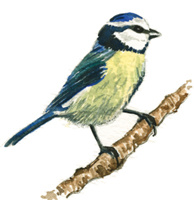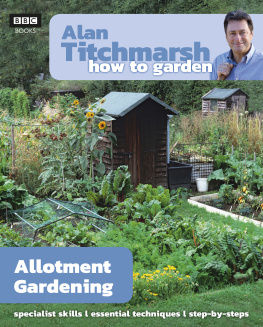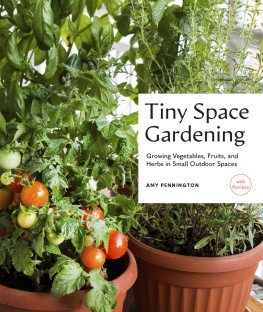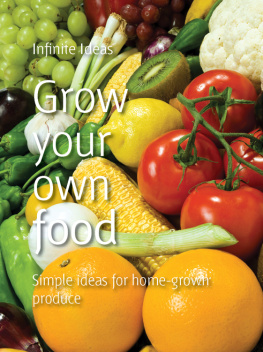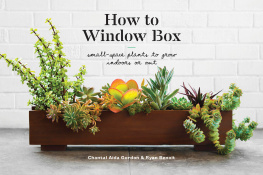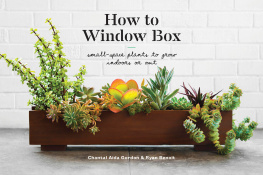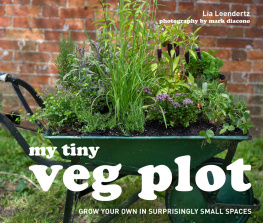Window-box Allotment

For my Mother,
And the Encouragers,
With love:
Mary Barnard
Richard Brown
Shane Butler
Jo Christian, my publisher
Helen MacTaggart
Alma Marianos
Eva Papastratis, my literary agent at Curtis Brown
Kate and Anthony Rogers
Carolina Rawlings
John and Judy Russell
Ann Schlee
And the Tuesday friends
Frances Lincoln Limited
74-77 White Lion Street
London
N1 9PF
Window-box Allotment
Copyright Frances Lincoln Limited 2013
Text copyright Penelope Bennett 2013
Illustrations copyright Becky Clarke 2013
Photographs copyright Clive Boursnell 2013
First published by Ebury Press 2001
This revised, expanded and illustrated digital edition published by Frances Lincoln Limited 2013
All rights reserved. No part of this publication may be reproduced, stored in a retrieval system, or transmitted, in any form, or by any means, electrical, mechanical, photocopying, recording or otherwise without the prior written permission of the publisher or a licence permitting restricted copying. In the United Kingdom such licences are issued by the Copyright Licensing Agency, Saffron House, 6-10 Kirkby Street, London EC1N 8TS.
E-book conversion by Integra
ISBN 9781781011324
Contents
Introduction
He who plants a garden plants happiness.
Chinese proverb
Window-boxes make excellent homes for vegetables, herbs and fruit
Window-boxes dont insist on being planted with petunias, geraniums and dusty rags of trailing ivy. They make equally good homes for vegetables, fruit, spice and herbs. Growing now, in January, in window-boxes, pots and hanging baskets on my west-facing, 16 x 9ft (4.9 x 2.7m) central London roof garden are Swiss chard, frizzy endive, pak choi, perpetual spinach, lambs lettuce, garlic chives, rocket, mitsuba (a type of Japanese parsley), celeriac, winter purslane and curly-leaf parsley. There will be more later in the year, such as dwarf beans, wild strawberries, tomatoes, Salad Bowl lettuce and aubergines. Most of the vegetables growing now were sown last spring and autumn, except for the spinach and Swiss chard which were sown two years ago.
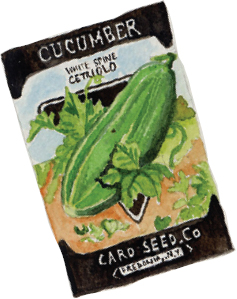
Containers are perfect for the elderly, children and the disabled
Almost everyone can have a miniature allotment. Young, small hands and elderly, stiff hands can dig or trowel-dig compost that is only a few inches deep. For those who cannot see, window-boxes and pots are easy for fingers to walk over and examine. They are also good for backs that cannot bend; for those who find sitting (especially in a wheelchair) easier; and for those who prefer kneeling or standing. And for people who live in flats without window ledges, there is seed sprouting to try (see ). Only a small investment is needed hardly an overdraft and this can be made month by month.
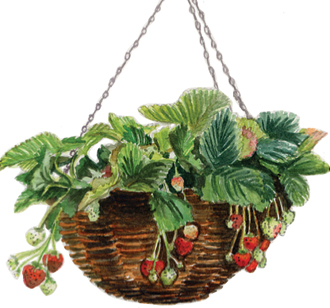
Small-scale container gardening is easier to observe
Both people without and people with gardens can enjoy window-box gardening because it is quite different from garden gardening. Unless you are a snail or a worm, you cant see seeds sprouting: the eyes are too far away from the ground. But containers can be placed at eye level and are on a small scale. Because such gardening is intimate, you are more a part of it and can observe more of what is going on, particularly through a magnifying glass: the cucumber slowly fattening and lengthening, the wild strawberry flower mysteriously changing into fruit. Although it is small, the enjoyment, interest and enrichment it produces are immense.
I am not a horticulturist, just an enthusiastic beginner. What follows are not intended to be dictatorial instructions, but simply suggestions which may be followed, partly followed or ignored.
January
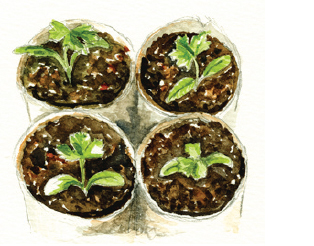
Now is the time for preparation
Start collecting small mustard-and-cress-sized plastic supermarket containers (measuring about 6 x 4 x 2in/15 x 10 x 5cm), preferably transparent ones, because lengthening roots are interesting to watch. Larger containers those in which the concrete-like supermarket peaches are sold can also be useful for more vigorous seeds and beans. Also collect the cardboard cores of toilet rolls. These make good cylinders for runner bean germination.
Buy some organic peat-free, seed-sowing compost. As you will be not only admiring the results of your sowing but eating them too, buy organic compost unless you find the idea of garnishing your food with sprinklings of artificial fertilizers appealing. Only a little is needed, so begin with the best.
Organic
The Oxford English Dictionary definition: Of, relating to, or derived from living matter. A fertilizer or manure produced from natural substances, usually without the addition of chemicals.
One knows these words as acquaintances; the definitions just deepen the acquaintance.
Buy a small sieve for sifting soil; also some plastic plant labels and a soft lead pencil. Invest in the smallest electric propagator. Alternatively, if youre uncertain whether youre going to enjoy window-box gardening, buy a full-sized seed tray with a transparent plastic lid, or a roll of cling film. To prevent the spread of disease, everything should first be washed in a mild solution of household bleach or sterilizing solution and then thoroughly rinsed. This is pleasurable winter-hibernation work, ones hands in warm, soapy water. It makes January a friendlier month and brings spring forward. All that is needed now is time to study the seed catalogues.
Fear of sowing
It is astonishing how many grown-up people have never sown a single seed. The idea of seed sowing seems to fill them with trepidation, as though it is some magical process (which, of course, it is) only for the cognoscenti, and from which they are excluded. In fact seed sowing is one of the simplest things to do. If birds and breezes can do it, it should not be beyond humans, and 75 per cent of the work is done by the seeds themselves.
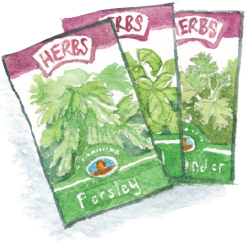
Trial parsley-seed sowing
For those who have never done any sowing, January is a good time to practise, before the real seed-sowing months arrive. Despite the saying that parsley should be sown when naked by moonlight, it can also be sown successfully indoors, when you are fully clothed and during daylight. It is one of the few plants that can be germinated indoors all the year round.
It is not necessary to have a potting shed, greenhouse or anywhere special to sow seeds. All that is needed is a table spread with newspaper.
The following basic instructions apply to sowing most of the seeds mentioned in this book.
1. Make drainage holes in the bottom of one of the plastic supermarket containers (some are already pierced), piercing them from the inside out to make certain the drainage works.
2. Crumble any lumps in the compost, then sieve it into the container until it overflows. The compost needs to be fine and friable (easily crumbled) to create a comfortable bed for the seeds and their roots to grow in imagine yourself living in the compost. For those who are fond of their hands and dont like the idea of touching compost, rub them with barrier cream before resorting to gloves; this at least lets the hands feel what they are touching, whereas gloves do not, a large proportion of the pleasure being on the other side of the glove one might as well wear gloves while making love.
Next page
